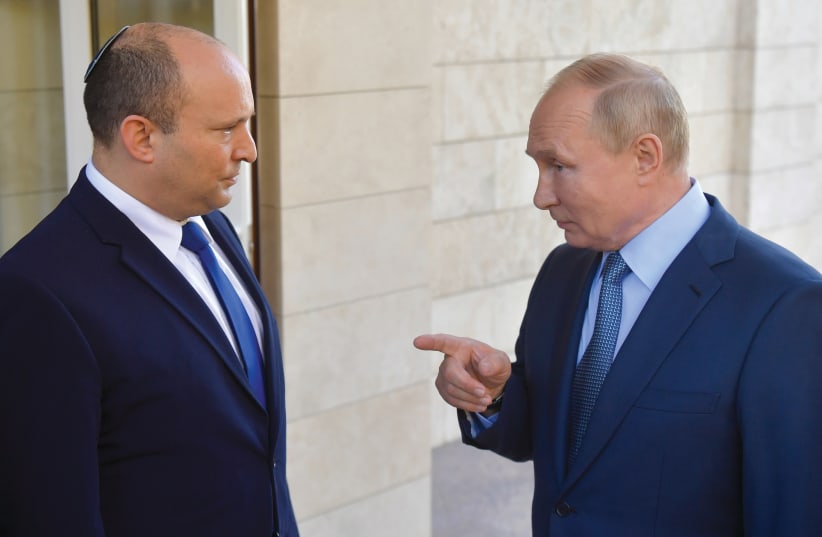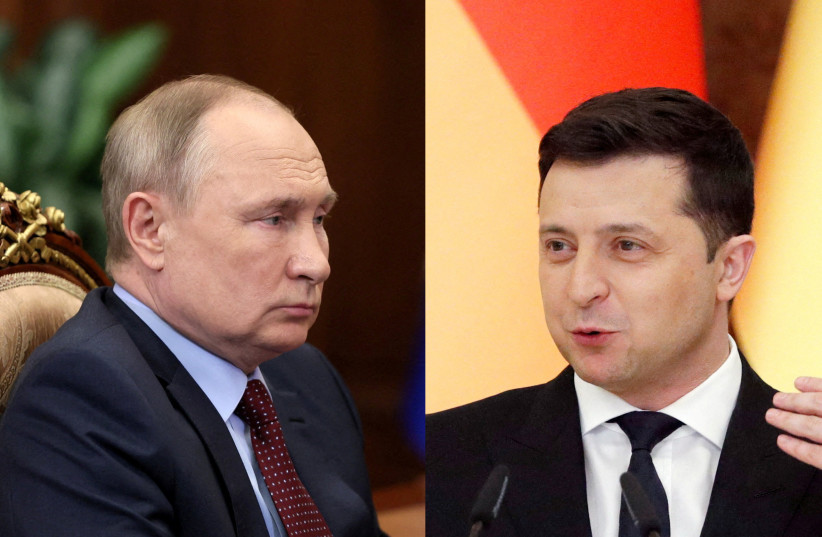Jerusalem is a constructive place to hold ceasefire negotiations with Ukraine and Russia, Ukrainian President Volodymyr Zelensky told reporters on Saturday as he gave a positive boost to Prime Minister Naftali Bennett’s efforts to mediate an end to the war.
“I said to [Bennett] that at present it’s not constructive to hold meetings in Russia, Ukraine, or Belarus,” Zelensky said referring to a telephone conversation he had with Bennett last week.
“These are not the places where we (the leaders of the involved countries) can agree to stop the war... Do I consider Israel, Jerusalem in particular, to be such a place? I think the answer is yes.”
Zelensky’s words came shortly before an hourlong phone call with Bennett "about ways to stop the fighting in Ukraine and Israel's efforts in that regard," the Prime Minister's Office stated.
The Ukrainian president also spoke after a week in which Bennett was one of a number of world leaders who attempted to use diplomacy to halt Russia’s invasion of Ukraine that began 17 days ago.
On March 5, Bennett flew to Moscow to meet with Russian President Vladimir Putin and has subsequently spoken twice with him and four times with Zelensky.
In speaking with reporters, Zelensky lauded those efforts. “I believe [Bennett] can play an important role, because Israel is a country with a lot of history and parallels (to our situation), as well as having a large migration of Jews from Ukraine, Russia, and Belarus,” Zelensky said in a briefing.
As a sign that he considered Israel an important interlocutor Zelensky mentioned Israel when calling on world leaders to pressure Russia to release the mayor of Melitopol Ivan Fedorov from captivity. He has been held by them since Friday.
“Throughout the night and today we constantly talk to our partners about this situation with our mayor. The demand is simple – to release him from captivity immediately.
“We appeal to all world leaders who speak to Moscow. France, Germany, Israel and others,” Zelensky said.
On Saturday, Ukrainian and Israeli officials rejected a report carried by Israel’s Walla news, The Jerusalem Post and US news site Axios that had downplayed Bennett’s role. Citing an unidentified Ukrainian official, it said that Bennett had urged Ukraine to give in to Russia.
“This report isn’t just inaccurate but patently false,” a senior official in Bennett’s office said.
“At no point did Prime Minister Bennett advise President Zelensky to take a deal from Putin – because no such deal was offered to Israel for us to be able to do so.
“Prime Minister Bennett has at no point told Zelensky how to act nor does he have any intention to. The dialogue between Bennett and Zelensky is good and the option of a mediation meeting in Jerusalem has been raised,” the official stated.
“Prime Minister Bennett is focused on one thing: stopping the bloodshed and suffering in Ukraine,” the official stated.
The official added that “the dialogue between Bennett and President Zelensky took place on a secure line – the credibility of the ‘senior sources’ claiming to have been in on the call should be questioned.”
Mykhailo Podolyak, an adviser to Zelensky, tweeted that Israel, “just as other conditional intermediary countries, does NOT suggest Ukraine agree to any demands of the Russian Federation.”
He stressed that “this is impossible for military [and] political reasons. On the contrary, Israel urges Russia to assess the events more adequately.”
No such deal was offered to Israel for us to be able to do so,” the official said.
Moscow has said little about Bennett’s mediation efforts. It has issued terms, including that Ukraine recognize Crimea as Russian, and Russian-backed breakaway areas as independent. Kyiv says it will not cede any territory.One official briefed on the mediation, and who spoke to Reuters on condition of anonymity, envisaged a potential situation where the warring countries “put it (the recognition issue) on the side, perhaps for 10 or 15 years.”
As a possible precedent, the official cited the Soviet-Japanese peace pact of 1956 that left the status of disputed islands unresolved. It was not immediately clear if the remarks reflected wider thinking in Kyiv or Moscow.
The crisis diplomacy, coordinated with the United States, Germany and France, has been a high-wire act for Bennett.He has left it to his foreign minister to condemn the Russian invasion in Israel’s name. That, said another official, was meant to keep Putin’s door open to the Israeli prime minister.
“Power in Russia is pooled entirely around this one man. It’s highly personal. Israel has managed relations with Russia through leader-to-leader contacts, and that requires avoiding soundbites that might stir up ill will,” the official said.
Citing the time that Putin and Zelensky have invested in speaking to – and through – Bennett a senior official in Israel’s Foreign Ministry, Simona Halperin, said in a radio interview on Thursday that the mediation efforts “certainly, certainly have a chance of succeeding.”
On Friday, US Under Secretary of State for Political Affairs Victoria Nuland told Channel 12 that Bennett’s efforts as a negotiator were welcome.
“Unfortunately Putin’s demands are maximalist. He is asking for the capitulation of Ukraine. And they [the Ukrainians] are not planning on capitulating,” she said.
Israel, she explained, “had in the past a strong relationship with the Kremlin. We are grateful that the prime minister was willing to use that and continues to be willing to use that to try and get this war to end. Unfortunately, President Putin doe not appear to be listening,” Nuland said.
Ukraine’s Ambassador to Israel Yevgen Korniychuk, however, on Friday expressed his frustration with Israel and downplayed the impact of Bennett’s mediation efforts even as he contended that the Jewish state had the potential to be a powerful advocate for his country.
He wryly commented, with a reference to figures born in Ukraine, that “if [former Israeli prime minister] Gold Meir or [former Zionist leader] Ze’ev Jabotinsky was in power,” the story might be different.“My understanding is that Israel does not have any exclusivity on the mediation” process, he said.“I am not aware of any immediate tasks that have been taken by the Israeli government at the moment” to mediate, Korniychuk added.
United Nations Secretary-General Antonio Guterres spoke with Bennett on Thursday about his diplomatic efforts. According to Bennett’s office, the two men “discussed the situation between Russia and Ukraine, as well as efforts to provide humanitarian assistance to Ukrainian citizens.”Guterres’ spokesperson Stefane Dujarric added that the conversation had also dealt with the “ongoing diplomatic efforts to find an end to the conflict in Ukraine.”The prime minister and the secretary-general agreed to remain in contact,” he said.
Bennett said after his talk with Guterres that “Israel would continue to act to prevent bloodshed and to bring the two sides from the battlefield to the negotiation table.”Guterres initiated the call as part of a number of conversations he has held with world leaders including German Chancellor Olaf Scholz and European Council President Charles Michel.Bennett and Guterres met in September when the Prime Minister visited New York to address the General Assembly.

